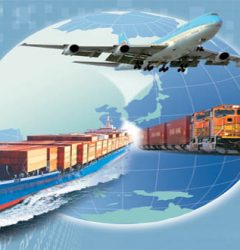24 Nov

Studies in the logistics industry show a clear need to update current work models. Logistics, supply chain, and shipping managers need more flexibility in business operations to optimize the entire process. This will only improve the overall customer service and reduce some manual operations, which will save a lot of costs for one company.
Today, a revolution in this direction is the digital transformation in logistics technologies that are fully contributing to the logistics business. It is the way to increase operational efficiency and customer satisfaction. Digitization makes a number of companies compete in this highly challenging business development world. Technology is a major factor in modern times, so there is considerable progress in the development of hardware and software applicable to small and large companies.
Benefits of Digital Transformation in Logistics
Logistics is developing steadily as the need for international and domestic trade is steadily growing. That is why everyone needs aid to increase control over operations and to reduce manual labor as much as possible. The best solution is a digital transformation. There are a number of software and mobile applications on the market that focus on the personal user interface and complete tracking of each shipment.
The benefits of logistics digitalization are many and have proven to be a great success among companies that use these innovations. Discover the most important benefits of implementing logistics software solutions – they will help you retain your current clients and continue to grow your customer base.
Increases Customer Satisfaction
Transport innovations are created to improve the logistics business – any service you offer to your customers. Consumers are looking for the best experience and are willing to pay if they are offered the optimal solution. The introduction of logistics management software digitizes to a large extent every process along the supply chain, which leads to customer satisfaction. It provides greater control of the business and the ability to respond properly in specific cases.
The digitalization of logistics is of great help to companies of different sizes (small, medium, and large) because every business strives to generate more revenue, increase customer satisfaction and develop production. Technological improvements favor the entire trading process by completing a faster logistics cycle. This improves the speed of service, which leads to confidence building, meeting the needs of more customers, and quality execution. Keep pace with your competitors, transforming your business with maximum digitalization.
Digital transformation in logistics enhances security
Technology digitalization allows for a tremendous strengthening of the supply chain, which has so far been a huge problem for logistics and transport companies. Contribute to higher inventory security while in storage and transport. Tracking of each shipment is possible, which allows complete control.
An optimal route plan may be drawn up. This is important for wasting unnecessary time because congestion points and problematic areas can be avoided. In this way, the number of risks is minimized. Digital transformation is a secure way to seamlessly transport all goods from point A to point B, with minimal cost and a high-security guarantee.
Logistics software unlocks new opportunities
If you rely on outdated business models without worrying about improvements that come with time, many customers are likely to focus on your competitors. However, if you think of continuous refinement that will lead to a more exciting user experience, you will stand out.
Many logistics companies use technology to not only improve the efficiency of some operations but also transform part of the work in a new way. The important thing is that everything leads to optimizing and generating higher profits. Functions that do not require human intervention may be performed, and this automation is a necessity for every business.
Try to explain very carefully to your logistics provider what exactly you need to use in a package that is right for you. Many functions and solutions for transportation and logistics companies can be combined to fulfill their development plan and implement the right strategy. You will see numerous horizon opportunities that will unlock additional benefits for your business.
Five Key Technologies for Immediate Digital Transformation in Logistics
Over time, every logistics process must evolve to provide better customer service (delivering deliveries in less time with less cost). That’s how almost all logistics companies work. Established companies in the market, as well as all new entrants, must adopt new technologies. Thanks to them, optimal automation is achieved at every stage of the supply chain.
This is why there is a steady increase in the digitalization of the logistics industry. With the technology revolution, logistics gains efficiency, security, profitability, increased customer satisfaction, and the opportunity for rapid development. Among the five key digital transformation technologies in logistics are e-AWB, cloud logistics, big data, blockchain, and IoT. They will make global chains faster, more resilient, clearly customer-oriented, and at a lower cost.
e-AWB
The electronic air waybill (e-AWB) is an important document when transporting goods by air. That is why it is one of the first steps in the transition to digitalization in the logistics industry. In fact, it is a transformation of traditional paper-based document production into digital. e-AWB is used to track the cargo from the time it is sent to the final destination.
The move to automated e-AWB generation entails a leg up for the deployment of other digitalization options in logistics. This is the main technology of air transport, after which there is noticeability in other areas – big data, cloud logistics, and IoT.
Big Data and Machine Learning
The need for data collection in every industry is more than a significant event, and twice as much in logistics. Until a few years ago, all of this was done on paper, while the technological revolution offered great relief. Today, the transformation into process digitalization makes it much easier and faster to consolidate the information you need. This leads to better control, more accurate forecasting, risk management, and optimization of the routes along which the shipments go.
Many risky situations can be minimized by the ability to properly compare current data. For example, congestion or placing the goods in conditions that would put them at risk can be avoided, as well as suggesting an increase in future sales. Future moments and to take an adequate response.
Cloud Logistics
Cloud logistics gives you the huge advantage of storing valuable information in the supply chain. An integrated global overview is being created to the benefit of all logistics and transport companies. Thanks to the cloud system, the whole process is easier and cheaper – from ordering to invoicing. With the development of such computing calculations, where data processing becomes closer to the cloud, services will become more accessible.
IoT (Internet of Things)
IoT is one of the enormous benefits for the logistics business. Allows virtually every site to be connected via the Internet to maximize the traceability and transparency of the entire process, from departure from supplier to delivery to the final destination. IoT is a revolution that offers many functions to customers, suppliers, and logistics.
Blockchain
Blockchain is a technology for data decentralization. Clear transparency is achieved and valuable information is collected for all participants along the delivery path. This high technology enables the rapid development of global trade and the increase of GDP. Blockchain-based schemes that play an important role in tracking allow customers to perform a number of product checks – their authenticity, compliance, and so on.
Improving efficiency and security along the supply chain is tantamount to improving the performance of all logistics services. Blockchain reduces all processes to maximum automation, including automatic invoicing and payment (upon reaching the final destination).




